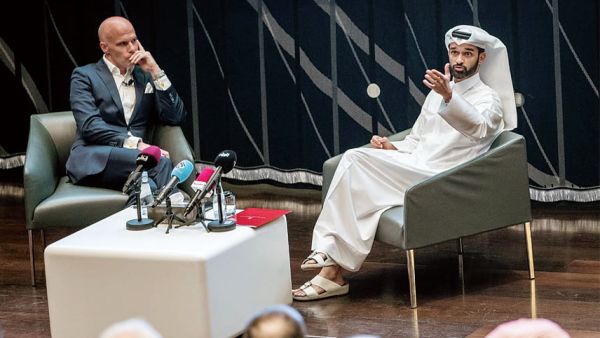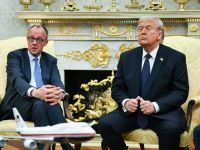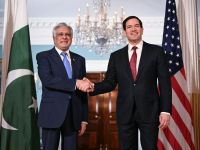Supreme Committee for Delivery & Legacy Secretary-General Hassan al Thawadi has underscored the impact of the country’s preparations for hosting the 2022 FIFA World Cup in driving significant developments such as infrastructure growth and labor reforms as well as in terms of legacy for the nation and the region.
During the Education City Speaker Series moderated by Qatar Foundation Editor-In-Chief for External Communications Michael Jabri-Pickett at the Qatar National Library on Monday, Thawadi stressed that many developments in place for the World Cup will go beyond 2022 and will be expanded and further developed as guided by the Qatar National Vision 2030 and as part of the legacies the committee identified since the rights to host the World Cup was awarded to Qatar in 2010.
Thawadi said Doha Metro, which has been fully operational since last year and significantly impacted the lives of people of Qatar, is among the results of the efforts in ensuring that the requirements of World Cup preparations fit in.
He said World Cup preparations have been a catalyst in pushing forward with the Doha Metro project, which will be expanded.
Similarly, he said, major expressways in Qatar will be up and running according to the schedule.
While two stadiums have been fully operational since last year, three more stadiums will be ready by the end of this year, he said.
He also mentioned the Club World Cup 2020 edition which will be hosted in Qatar towards the end of the year.
“This is a once-in-a-lifetime opportunity, not just a football tournament for 28 teams. It’s a chance for the world to come and see who we are and build bridges between nations and people, and to break down stereotypes. That is a given. But the much more important part is the tangible impact it has on people’s lives, and every initiative we have seeks to do that,” Thawadi added.
“Major sporting events place a lot of requirements on a host nation. And from our experience, it’s very important that the plans you have in place fit with the nation’s overall development plans. That’s what we did,” he said.
“From day one, we recognised we were lucky to have a 12-year gap from when we won the right to host the World Cup. That allowed us to plan, but also to sit down and develop our legacy plans. The legacy started from day one. Many nations only start looking at legacy after the tournament, but we planned for it. We worked hard to communicate and engage with stakeholders from the beginning to understand what our nation’s goals and vision were, and what was required, and how we could fit into that.”
Further commenting on the legacies of the tournament, Thawadi said a national volunteering strategy will be launched in two to three months that addresses the issue of developing volunteering capacity for the World Cup.
He said the strategy is also about instilling the volunteer essence and ethos within our communities and within ourselves - Qataris, expatriates, visitors and everyone else.
“The idea is to demonstrate civic engagement and enable people to contribute to their communities through volunteering. It instills a sense of camaraderie and responsibility and community. A national volunteer strategy aims to bring together different stakeholders to develop an initiative that will be one of the legacies that lasts beyond the World Cup.”
On other initiatives as part of the preparations such as in terms of research and technology, Thawadi said they are working with HBKU on a groundbreaking project that would benefit the fans, workers and on a global level.
He added that they have also partnered with Georgetown University Qatar to work on an initiative that will look into behaviour insights such as looking at engaging with fans and enhancing their experience.
On the impact of World Cup in advancing significant worker’s welfare reforms, he said Qatar is always committed on the matter as it has always been embedded into the Qatar National Vision 2030.
He said the World Cup has been a catalyst that has allowed for significant amount of reforms that has happened in a very sustainable manner. He highlighted Qatar’s establishment of the universal minimum wage for the workers as well as SC’s efforts together with contractors to reimburse recruitment fees to workers engaged in World Cup projects.
He said, “The criticism of worker welfare in Qatar has died down, but we have to be realistic. Unfortunately, among the public, the perception has not changed and is still negative. We can’t be complacent and the progress we are making on worker welfare should not be restricted to the World Cup. It must be something we subscribe to because of our inherent values. We also need to identify the mistakes we have made in the past and look at how we avoid them in the future. At the SC, we look at ourselves as an experiment to see what works and then extend it nationwide. If you implement something without first testing it, the consequences can be significant and can even harm those it is supposed to benefit.”
On the issue of sustainability, he reiterated Qatar’s commitment in being the first carbon-neutral tournament. While on the issue of security, he assured the preparedness of the country on the matter as part of its major preparations.
To the delight of the audience, he also shared that they have been in talks with FIFA to develop ticketing strategy to ensure that there will be a significant portion that goes to the local market and a significant portion that will be available to the international fans as well.
By Ailyn Agonia








